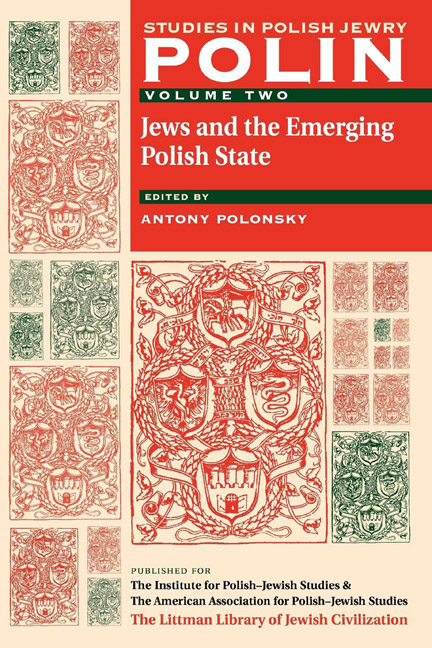Book contents
- Frontmatter
- Dedication
- Editors and Advisers
- Contents
- Polin: Studies in Polish Jewry
- Polin
- Statement From the Editors
- SYMPOSIUM: JEWS AND THE EMERGENCE OF AN INDEPENDENT POLISH STATE
- ARTICLES
- The Basic Privileges of the Jews of Great Poland as Reflected in Polish Historiography
- The Decline of the Polish-Lithuanian Kahal
- A Mobile Class. The Subjective Element in the Social Perception of Jews: The Example of Eighteenth Century Poland
- Polish Synagogues in the Nineteenth Century
- The image of the Jew in Polish Narrative Prose of the Romantic Period
- The Polish-Jewish Daily Press
- From ‘Numerus Clausus’ to ‘Numerus Nullus’
- DOCUMENTS
- COMMENTARY
- REVIEW ESSAYS
- BOOK REVIEWS
- Leiter to the Editors
- Contributors
- Obituaries
From ‘Numerus Clausus’ to ‘Numerus Nullus’
from ARTICLES
- Frontmatter
- Dedication
- Editors and Advisers
- Contents
- Polin: Studies in Polish Jewry
- Polin
- Statement From the Editors
- SYMPOSIUM: JEWS AND THE EMERGENCE OF AN INDEPENDENT POLISH STATE
- ARTICLES
- The Basic Privileges of the Jews of Great Poland as Reflected in Polish Historiography
- The Decline of the Polish-Lithuanian Kahal
- A Mobile Class. The Subjective Element in the Social Perception of Jews: The Example of Eighteenth Century Poland
- Polish Synagogues in the Nineteenth Century
- The image of the Jew in Polish Narrative Prose of the Romantic Period
- The Polish-Jewish Daily Press
- From ‘Numerus Clausus’ to ‘Numerus Nullus’
- DOCUMENTS
- COMMENTARY
- REVIEW ESSAYS
- BOOK REVIEWS
- Leiter to the Editors
- Contributors
- Obituaries
Summary
Almost from the beginning of its activities the National Democratic movement used nationalist slogans in its propaganda campaigns, chiefly antisemitic ones. This propaganda eventually achieved the desired results. Clearly, though, the policy of the National Democrats was only one part of the so-called ‘Jewish question’, and the events described below were only a small part of the political programme of the National Democrats.
From the first days of the independent Polish state the National Democratic movement worked to curb the rights of the national minorities, particularly those of the Jews. Only a month after the assembly of the SeJm Ustawodawczy (Constituent Parliament) on 19 March 1919, the Związek Ludowo-Narodowy (Popular National Union) pointedly tabled a motion which resulted in a Commission for Jewish Affairs being set up. Its task was ‘the comprehensive examination of the Jewish question, employing a questionnaire designed by those circles most familiar with the matter, and the presentation of conclusions so derived, with a view to resolving the problem’. In the power struggle the Endecja (National Democrats) eagerly employed anti-semitic slogans, counting both on their universality and that they would be readily taken up by voters. The slogans were matched by deeds. In the lands which had once belonged to Austria-Hungary, Jewish railway workers were dismissed. It began to be increasingly difficult for Jews to find work in state and municipal enterprises. As early as 1919, Itzhak Griinbaum complained about the introduction of a percentage quota system for students admitted to Poznan University.
The universities became the testing ground for the National Democrats’ propaganda and methods. The susceptibility and responsiveness of youth to patriotic appeals were exploited, and it proved simple to transform them into nationalist slogans. Advantage was taken too of the severe economic situation and poor employment prospects. Because of the lack of employment opportunities for intellectuals, it was easy to convince young people that posts occupied by others should belong to the host community – to the ethnic Poles. A fundamental rallying cry of nationalist youth, which it used to gain control at the universities, was the campaign against what it believed was the excessively high level of young Jews entering higher education.
- Type
- Chapter
- Information
- Jews and the Emerging Polish State (Polin Volume Two) , pp. 246 - 268Publisher: Liverpool University PressPrint publication year: 2008

